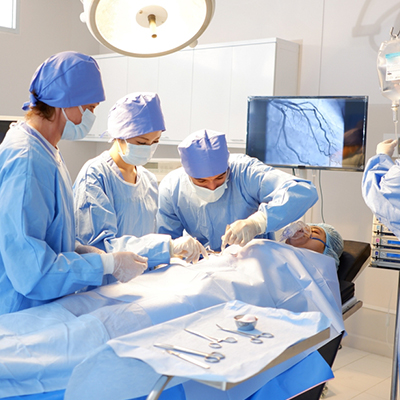General surgeon in Anantapur
General Surgery is a discipline of surgery having a central core of knowledge embracing anatomy, physiology, metabolism, immunology, nutrition, pathology, wound healing, shock and resuscitation, intensive care, and neoplasia, which are common to all surgical specialties. It is a is a surgical specialty that focuses on alimentary canal and abdominal contents including the esophagus, stomach, small as well as large intestine, liver, pancreas, gallbladder, appendix and bile ducts, and also the thyroid gland.
Sub-specialization in General surgery
Following are many different variations or sub-specialization of general surgery disciplines
- Trauma surgery
- Laparoscopic surgery
- Colorectal surgery
- Upper Gastrointestinal Surgery
- Breast surgery
- Vascular surgery
- Endocrine surgery
- Transplant surgery
- Surgical oncology
- Cardiothoracic surgery
- Pediatric surgery

Preparing for surgery as a patient
The preparations required for surgery are contingent upon your specific diagnosis. Your physician will provide detailed instructions on how to ready yourself for the procedure. If you are scheduled to receive general anesthesia, you may be required to adhere to the following guidelines:
- Refrain from consuming food and beverages for a designated period prior to the surgery.
- Cleanse or bathe, and potentially shave the surgical site.
- Complete any necessary blood tests, X-rays, electrocardiograms, or other assessments required for the surgery.
- In certain cases, you may be instructed to take an enema the night before the procedure to ensure your bowels are clear; please confirm this with your physician.
- Avoid applying makeup on the day of the surgery.
- Refrain from using nail polish.
- Do not wear contact lenses.
- Leave any valuables and jewelry at home.
- Inform the medical personnel about any dentures or prosthetic devices you may have.
Recovery Following Surgery
After the completion of surgery, patients are transferred to the recovery room, often referred to as the post-anesthesia care unit. In this setting, healthcare professionals will closely observe the patient as they regain consciousness from anesthesia. The duration of stay in the recovery area varies based on the specific surgical procedure and the individual’s response. During this time, the clinical staff may undertake the following actions
- Monitor vital signs, including blood pressure, heart rate, and respiratory rate
- Observe for any indications of complications
- Measure the patient's temperature
- Assess swallowing difficulties or gag reflex
- Evaluate the patient's level of consciousness
- Inspect any intravenous lines, tubes, or drains
- Examine the surgical wound
- Oversee intravenous fluid administration
- Monitor for bladder distension
Ensure patient comfort through pain management and appropriate positioning Patients can facilitate their recovery by engaging in specific breathing and movement exercises while in the recovery room. It is essential to consult with a healthcare provider before attempting any of these activities.
General surgery is essential for diagnosing, treating, and managing various conditions. Choosing the right surgeon and pursuing advanced training is crucial to ensuring the best possible outcomes. General surgery is quite a broad field, so selecting the right general surgeon to deliver the best results is essential to guarantee success in surgical procedures. It means you can make a rational decision based on factors like a surgeon's credentials, experience, board certification, and other patients' feedback.
